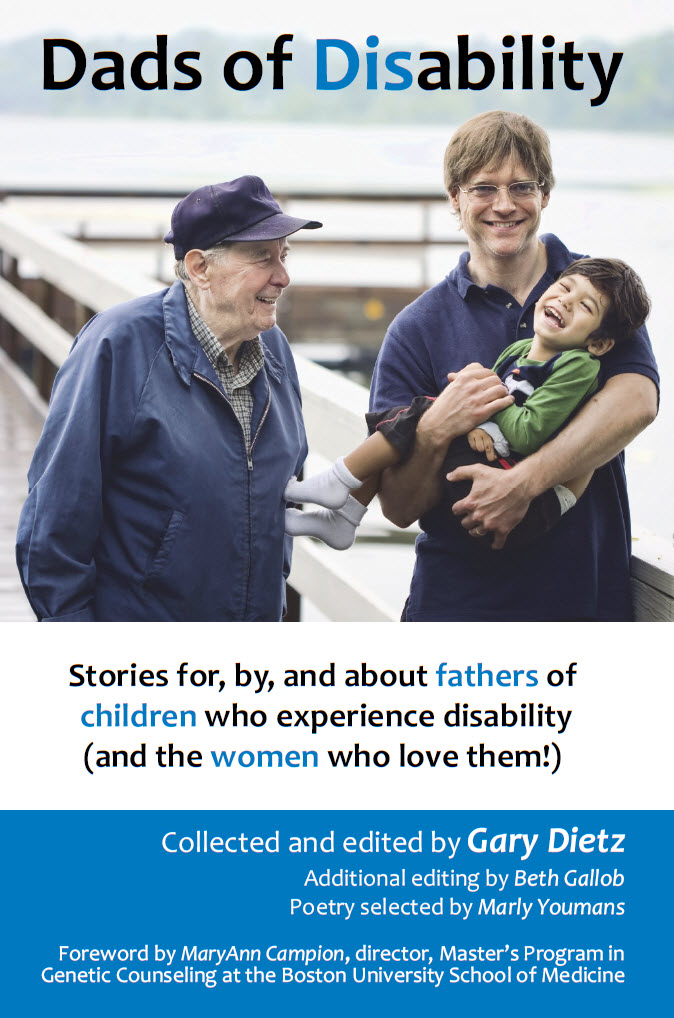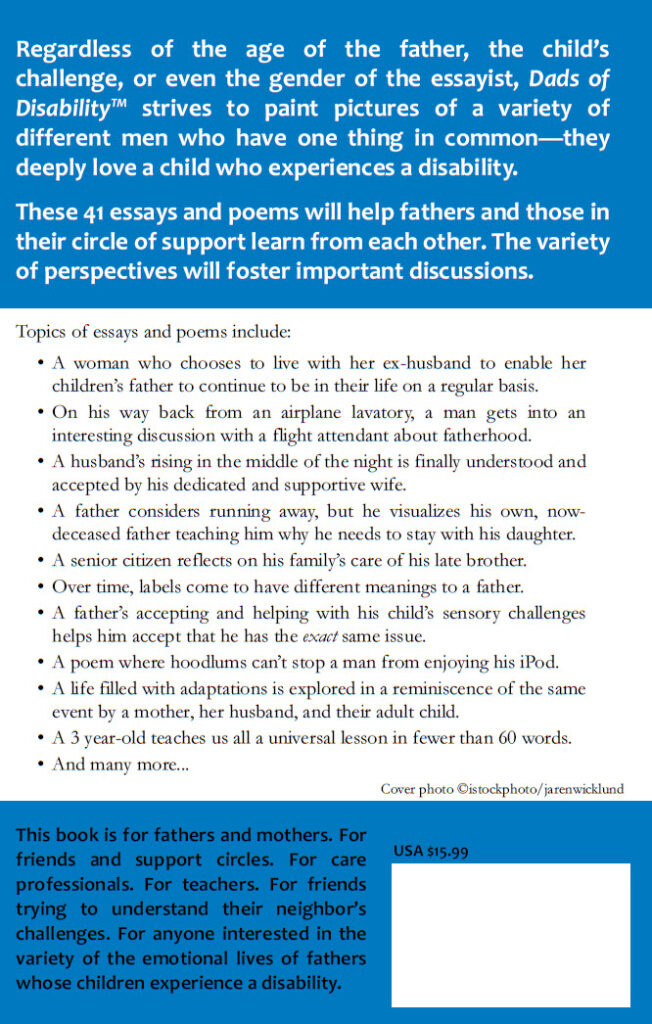About The Dads of Disability project.
You can purchase the Dads of Disability paperback on Amazon or at brick and mortar stores with ISBN numbers
ISBN-13: 978-0615971865
ISBN-10: 0615971865 (garymdietz)
About Dads of Disability: Stories for, by, and about fathers of children who experience disability (and the women who love them)
- Dads of Disability paperback on Amazon or Kindle or paperback at brick and mortar stores


An AI summary of the top 10 themes in the materials
Top 10 Themes Across the Essays and the Prompt Workbook
- Redefining fatherhood and masculinity
- Fathers confront and renegotiate expectations of “man up,” strength, and emotional expression at work and at home, often learning that vulnerability and caregiving are integral to being a father and a man.
- Grief, mourning, and ongoing adaptation
- Many narratives trace a non-linear path through grief, loss, and acceptance—from diagnosis days to long-term transitions—emphasizing adaptation over finality.
- Advocacy within imperfect systems
- Fathers navigate medical, educational, and social services that can dismiss parental insight, pushing them into roles as assertive advocates who demand to be heard and to tailor care to their child’s needs.
- Language, labels, and neurodiversity debates
- Authors and prompts wrestle with people-first vs. identity-first language, shifting terminology, and tensions between deficit framings and neurodiversity perspectives, urging critical, respectful usage driven by context and community.
- Joy in small wins and everyday life
- Amid challenges, fathers highlight concentrated joy—celebrating a first word, a small motor gain, or a shared activity—as sustaining meaning and motivation in family life.
- Stigma, bias, and public encounters
- Stories examine judgment in public spaces, workplace bias around male caregiving, and the strain of stares or intrusive questions, while prompts train responses ranging from de-escalation to direct advocacy.
- Faith, fate, and meaning-making
- Fathers engage faith and predestination differently—some finding comfort, others asserting agency—using belief (or non-belief) to frame resilience, responsibility, and hope.
- Cultural context and family structure
- Essays surface how race, culture, age, immigration, Deaf culture, and blended or single-parent families shape experiences and strategies, pressing for culturally aware practice and acknowledgment of diverse father roles.
- Partnering, coparenting, and family dynamics
- The texts explore marital strain, stay-at-home fatherhood, jealousy over role asymmetries, and post-divorce cooperation—with practical emphasis on communication, empathy, and role flexibility.
- Safety, regulation, and trauma-informed care
- Recurrent themes include sensory needs, reactive attachment, aggression, PTSD risk for caregivers, and balancing safety with autonomy—calling for trauma-informed, individualized approaches at home, school, and community.
How these themes show up across both sources
- The essays provide lived experiences that illustrate these tensions and growth arcs—e.g., an “office cry,” pushing back on clinical minimization, adopting from foster care and navigating RAD/SID, or negotiating faith-laden support in a confined space like an airplane aisle.
- The discussion and writing prompts convert those narratives into practice: probing biases, role-playing clinical and public encounters, dissecting language choices, planning advocacy, and designing culturally sensitive, father-focused support strategies for academic and professional settings.
Cross-cutting insights emphasized throughout
- Fathers need explicit inclusion in care teams and pedagogy, not as secondary caregivers but as equal, informed partners.
- Emotional literacy and peer connection among fathers mitigate isolation and enable sustainable advocacy and caregiving.
- Precision in language and openness to multiple models of disability (medical, social, cultural-linguistic) improve alignment with family values and community identities.
- Celebrating micro-progress and everyday joys acts as a counterweight to cumulative stress, supporting long-term resilience.
These themes recur in both the anthology’s structure and the workbook’s chapter-by-chapter prompts, forming a coherent scaffolding for understanding and supporting fathers in disability contexts across clinical, educational, and community settings.
The Backstory of Dads of Disability
Why me? My son has a rare genetic disorder. When he was 12, after exhausting many other options, he entered a residential school. At that point, my depression and guilt could have gone in many bad directions. Instead, I chose to research the need and develop a book of essays by and about fathers to help professionals, parents, and caregivers build empathy and see the worldview of our special band of fathers.
How it came about? I made about 100 phone calls to genetic counselors, and found out that almost without fail, they wanted additional resources for them and their clients to help fathers and those that support them. So I spent the next 18 months in an odyssey of crowdfunding, emails, phone calls, book layout, working marketing contracts to pay the mortgage, and at the same time managing my son’s placement and caring for him.
Success! The book was published. I ended up being the subject of many podcasts, articles, and even coordinated and ran a speaking tour which led me, among other places, to speak to Masters in Genetic Counseling Students at Tufts, Brandeis, Johns Hopkins/NIH (where a White House representative attended and had tea with me after!) and lead a fathers storytelling group for the Williams Syndrome Association. I was also privileged to be asked to write many guest blogs for amazing organizations, including an Easter Seals home page essay.
Who it’s helped. The book has been useful for genetic counselors, social workers, special education teachers, physicians, psychologists, and parents and caregivers. It’s about empathy. The book has even saved a life (I am not ready to tell that story yet, but it’s true!).
Testimonials
Columbia University
“As the director of the Columbia University Genetic Counseling Graduate Program I recognize the importance of providing our students with real world examples of the challenges of integrating fathers into the circle of care. The “Dads of Disability” department license provides an inexpensive way to share these lived experiences with my students which both raises their awareness about this important component of providing clinical care and allows them to consider how they want to engage their future clients to best promote a therapeutic working alliance with all clients.
The associated conversation prompt workbook is a helpful adjunct, supporting faculty in creating challenging and useful class discussions and individual writing prompts that deepen students’ understanding of the material and allow for self-reflection. I would recommend the department license and workbook to colleagues educating future practitioners in various fields, including genetic counseling, special education, and social work.”
– Amanda Bergner Director, Columbia University Genetic Counseling Graduate Program
Brandeis University
“One of the pillars of the Brandeis University Genetic Counseling Program is the theme “Everybody Has a Story.” Learning from families who live with a disability or genetic condition allows our students to gain insight into what the patients they will see in clinic may be experiencing during their own journeys. Hearing from Dads, who are often overlooked, adds an important perspective that enriches their learning.
Gary Dietz has come to speak to our students at Brandeis a number of times, most recently as part of our Personal Narratives Series in January, 2021. Our students took Gary’s message, “don’t forget the Dads” to heart, with two now considering doing their thesis projects on the perspectives of fathers. Having the “Dads of Disability” department license and accompanying workbook with question prompts will allow our program to make sure Gary’s words will continue to be heard loud and clear by future generations of genetic counselors. We are grateful to have this as an educational tool for out students.“
– Gretchen H. Schneider, M.S. LCGC, Professor of the Practice, Director, Master’s Program in Genetic Counseling, Brandeis University
“…Our program places a strong emphasis on learning from a wide variety of personal narratives, particularly with parents of a child with a genetic condition and/or disability. His presentation broadens our understanding and challenges our thinking, revealing the biases we often hold towards fathers.“
– Gayun Chan-Smutko, MS, LCGC
Amazon Reviews of the Book
“I enjoyed the stories of fathers who looked back and saw so much joy and love from their children with disabilities and I loved the quite honest and sometimes hilarious, sometimes heart wrenching stories.“
– Spring McDonald (from Amazon review)
“Being able to read short accounts of various perspectives is a great way to help another person feel like they aren’t on their own in this journey through life.“
– Joanna Keating-Velasco (from Amazon review)
An amazing review from a blog by Shawn Remfrey
Here’s an excerpt: “I can hear some of you out there saying you don’t have a special needs child and don’t know any and so this book has no significance to you. Wrong. Believe it or not, this isn’t just about special needs children. It’s about the fact that our children aren’t always what we imagine they’ll be and we have to learn who they are and embrace it. It’s about that as parents we have emotions that we sometimes feel guilty about, but it’s normal. It’s about people helping people to get through the hardships of life. Just having that one person you can call and cry with when your nine year old child says their first word. Or, you may be the person who ends up with the parent of a disabled child who’s have a mini breakdown. Unless you understand where they’re coming from, there’s no right way to handle it. It can be shocking and scary. There’s no such thing as being too informed or too aware, especially when it comes to your fellow man.”